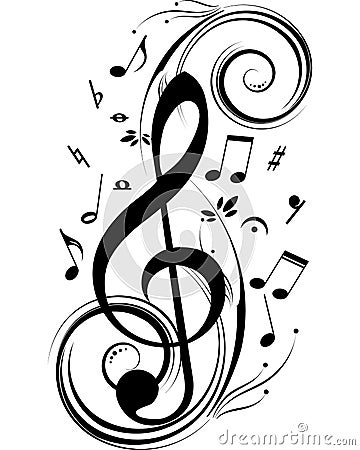Part 1
- It seems that we have an inborn instinct for melody, which was "preinstall" in us before we were born. It's the same instinct we have for language: we can recognise notes and tunes as naturally as we can learn words. That's why melody is very similar to language.
- Pentatonic is a musical scale, which consists of five notes. Every music system shares these five notes in common, so pentantonic scale can be found all over the world. It's important, because we can easily recognise these notes. Enormous numbers of songs of different music styles are based on these notes. They are our genetic inheritance, like five fingers.
- Notes: C - до, D - ре , E - ми , F - фа, G - со, A - ля, H - си
- Every musical system has its own number of notes. In Western scale there are twelve notes, other cultures have many more, so it makes notes sound much closer together.
- Pitch (высота) - is a major auditory attribute of musical tones. It discribes how "high" or "low" you want your note to sound.

Part 2
- Interval (интервал) - is a distance between two notes. Semitone (полутон) - is the smallest musical interval in Western scale. Whole tone (целый тон) - is an interval of two notes
- The experiment proves that any basic combination of notes could turn into a melody.
- Just like in story-telling, there are also archetypes - ancient arragements - in tune. They are scales, which help to compose a melody. There are different sets of notes in different cultures, but nevertheless they share a basic concept.
- Mode (Лад) - a set of musical notes forming a scale and from which melodies and harmonies are constructed
- The names of modes come from ancient Greece. Tunes in the Aeolian mode sound solemn and sorrowful.
- To sharpen the note (повышать ноту) - to raise the note by a semitone.
- to flatten the note (понижать ноту) - to low the note.
- sopranos and tenors
- Diatonic (диатонический) - a system, where all instruments can play together. The new scales were disigned to be totally competative with each other, so the music can be palyed without collusions.
- simple melody
- moody and pationate part
- minor scale turns into major
- short and dramatic melody
Part 5
The old modes can be heard in the song. Sting associated the ancient British sound with modern
4 ingridients: African melodies, melodies of non-conformist religious groups, folk and classical music, jewish folk music.
Комментариев нет:
Отправить комментарий